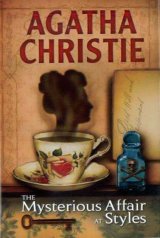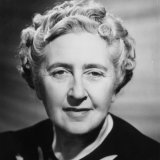The Mysterious Affair at Styles Page #2
The Mysterious Affair at Styles is a detective novel by British writer Agatha Christie. It was written in the middle of the First World War, in 1916, and first published by John Lane in the United States in October 1920 and in the United Kingdom by The Bodley Head on 21 January 1921.
“Weeds grow like house afire. Can’t keep even with ’em. Shall press you in. Better be careful.” “I’m sure I shall be only too delighted to make myself useful,” I responded. “Don’t say it. Never does. Wish you hadn’t later.” “You’re a cynic, Evie,” said John, laughing. “Where’s tea to-day—inside or out?” “Out. Too fine a day to be cooped up in the house.” “Come on then, you’ve done enough gardening for to-day. ‘The labourer is worthy of his hire’, you know. Come and be refreshed.” “Well,” said Miss Howard, drawing off her gardening gloves, “I’m inclined to agree with you.” She led the way round the house to where tea was spread under the shade of a large sycamore. A figure rose from one of the basket chairs, and came a few steps to meet us. “My wife, Hastings,” said John. I shall never forget my first sight of Mary Cavendish. Her tall, slender form, outlined against the bright light; the vivid sense of slumbering fire that seemed to find expression only in those wonderful tawny eyes of hers, remarkable eyes, different from any other woman’s that I have ever known; the intense power of stillness she possessed, which nevertheless conveyed the impression of a wild untamed spirit in an exquisitely civilised body—all these things are burnt into my memory. I shall never forget them. She greeted me with a few words of pleasant welcome in a low clear voice, and I sank into a basket chair feeling distinctly glad that I had accepted John’s invitation. Mrs. Cavendish gave me some tea, and her few quiet remarks heightened my first impression of her as a thoroughly fascinating woman. An appreciative listener is always stimulating, and I described, in a humorous manner, certain incidents of my Convalescent Home, in a way which, I flatter myself, greatly amused my hostess. John, of course, good fellow though he is, could hardly be called a brilliant conversationalist. At that moment a well remembered voice floated through the open French window near at hand: “Then you’ll write to the Princess after tea, Alfred? I’ll write to Lady Tadminster for the second day, myself. Or shall we wait until we hear from the Princess? In case of a refusal, Lady Tadminster might open it the first day, and Mrs. Crosbie the second. Then there’s the Duchess—about the school fête.” There was the murmur of a man’s voice, and then Mrs. Inglethorp’s rose in reply: “Yes, certainly. After tea will do quite well. You are so thoughtful, Alfred dear.” The French window swung open a little wider, and a handsome white-haired old lady, with a somewhat masterful cast of features, stepped out of it on to the lawn. A man followed her, a suggestion of deference in his manner. Mrs. Inglethorp greeted me with effusion. “Why, if it isn’t too delightful to see you again, Mr. Hastings, after all these years. Alfred, darling, Mr. Hastings—my husband.” I looked with some curiosity at “Alfred darling”. He certainly struck a rather alien note. I did not wonder at John objecting to his beard. It was one of the longest and blackest I have ever seen. He wore gold-rimmed pince-nez, and had a curious impassivity of feature. It struck me that he might look natural on a stage, but was strangely out of place in real life. His voice was rather deep and unctuous. He placed a wooden hand in mine and said: “This is a pleasure, Mr. Hastings.” Then, turning to his wife: “Emily dearest, I think that cushion is a little damp.” She beamed fondly on him, as he substituted another with every demonstration of the tenderest care. Strange infatuation of an otherwise sensible woman! With the presence of Mr. Inglethorp, a sense of constraint and veiled hostility seemed to settle down upon the company. Miss Howard, in particular, took no pains to conceal her feelings. Mrs. Inglethorp, however, seemed to notice nothing unusual. Her volubility, which I remembered of old, had lost nothing in the intervening years, and she poured out a steady flood of conversation, mainly on the subject of the forthcoming bazaar which she was organizing and which was to take place shortly. Occasionally she referred to her husband over a question of days or dates. His watchful and attentive manner never varied. From the very first I took a firm and rooted dislike to him, and I flatter myself that my first judgments are usually fairly shrewd. Presently Mrs. Inglethorp turned to give some instructions about letters to Evelyn Howard, and her husband addressed me in his painstaking voice: “Is soldiering your regular profession, Mr. Hastings?” “No, before the war I was in Lloyd’s.” “And you will return there after it is over?” “Perhaps. Either that or a fresh start altogether.” Mary Cavendish leant forward. “What would you really choose as a profession, if you could just consult your inclination?” “Well, that depends.” “No secret hobby?” she asked. “Tell me—you’re drawn to something? Everyone is—usually something absurd.” “You’ll laugh at me.” She smiled. “Perhaps.” “Well, I’ve always had a secret hankering to be a detective!” “The real thing—Scotland Yard? Or Sherlock Holmes?” “Oh, Sherlock Holmes by all means. But really, seriously, I am awfully drawn to it. I came across a man in Belgium once, a very famous detective, and he quite inflamed me. He was a marvellous little fellow. He used to say that all good detective work was a mere matter of method. My system is based on his—though of course I have progressed rather further. He was a funny little man, a great dandy, but wonderfully clever.” “Like a good detective story myself,” remarked Miss Howard. “Lots of nonsense written, though. Criminal discovered in last chapter. Everyone dumbfounded. Real crime—you’d know at once.” “There have been a great number of undiscovered crimes,” I argued. “Don’t mean the police, but the people that are right in it. The family. You couldn’t really hoodwink them. They’d know.” “Then,” I said, much amused, “you think that if you were mixed up in a crime, say a murder, you’d be able to spot the murderer right off?” “Of course I should. Mightn’t be able to prove it to a pack of lawyers. But I’m certain I’d know. I’d feel it in my fingertips if he came near me.” “It might be a ‘she’,” I suggested. “Might. But murder’s a violent crime. Associate it more with a man.” “Not in a case of poisoning.” Mrs. Cavendish’s clear voice startled me. “Dr. Bauerstein was saying yesterday that, owing to the general ignorance of the more uncommon poisons among the medical profession, there were probably countless cases of poisoning quite unsuspected.” “Why, Mary, what a gruesome conversation!” cried Mrs. Inglethorp. “It makes me feel as if a goose were walking over my grave. Oh, there’s Cynthia!” A young girl in V.A.D. uniform ran lightly across the lawn. “Why, Cynthia, you are late to-day. This is Mr. Hastings—Miss Murdoch.” Cynthia Murdoch was a fresh-looking young creature, full of life and vigour. She tossed off her little V.A.D. cap, and I admired the great loose waves of her auburn hair, and the smallness and whiteness of the hand she held out to claim her tea. With dark eyes and eyelashes she would have been a beauty.
Translation
Translate and read this book in other languages:
Select another language:
- - Select -
- 简体中文 (Chinese - Simplified)
- 繁體中文 (Chinese - Traditional)
- Español (Spanish)
- Esperanto (Esperanto)
- 日本語 (Japanese)
- Português (Portuguese)
- Deutsch (German)
- العربية (Arabic)
- Français (French)
- Русский (Russian)
- ಕನ್ನಡ (Kannada)
- 한국어 (Korean)
- עברית (Hebrew)
- Gaeilge (Irish)
- Українська (Ukrainian)
- اردو (Urdu)
- Magyar (Hungarian)
- मानक हिन्दी (Hindi)
- Indonesia (Indonesian)
- Italiano (Italian)
- தமிழ் (Tamil)
- Türkçe (Turkish)
- తెలుగు (Telugu)
- ภาษาไทย (Thai)
- Tiếng Việt (Vietnamese)
- Čeština (Czech)
- Polski (Polish)
- Bahasa Indonesia (Indonesian)
- Românește (Romanian)
- Nederlands (Dutch)
- Ελληνικά (Greek)
- Latinum (Latin)
- Svenska (Swedish)
- Dansk (Danish)
- Suomi (Finnish)
- فارسی (Persian)
- ייִדיש (Yiddish)
- հայերեն (Armenian)
- Norsk (Norwegian)
- English (English)
Citation
Use the citation below to add this book to your bibliography:
Style:MLAChicagoAPA
"The Mysterious Affair at Styles Books." Literature.com. STANDS4 LLC, 2025. Web. 30 Jan. 2025. <https://www.literature.com/book/the_mysterious_affair_at_styles_309>.








Discuss this The Mysterious Affair at Styles book with the community:
Report Comment
We're doing our best to make sure our content is useful, accurate and safe.
If by any chance you spot an inappropriate comment while navigating through our website please use this form to let us know, and we'll take care of it shortly.
Attachment
You need to be logged in to favorite.
Log In